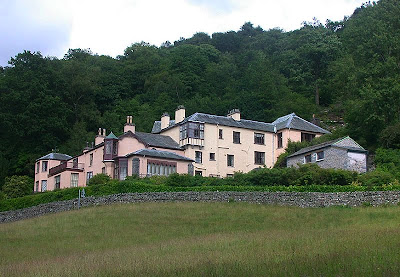
I can no longer say exactly what thoughts the sight of Manchester prompted in me then, but I believe I felt I had found my destiny.
.. Manchester has taken possession of me for good. I cannot leave, I do not want to leave, I must not.
- Max Ferber, in W.G. Sebald, The Emigrants Having grown up after the second world war in a Germany in which the Jews had disappeared and nobody wanted to talk about them, W.G. Sebald arrived in Manchester in 1966 to take up a post at the University. Here for the first time he realised that the holocaust had happened to "real people", and
The Emigrants, published over a quarter century later, initially in German (
Die Ausgewanderten), long after his short stay had ended, was based in part on the story of his Mancunian landlord, a Jewish refugee.

The image of mid to late twentieth century Manchester conveyed by Sebald is unlikely to do much for tourism in the city! Anyone who knows only modern day Manchester would certainly be surprised to read that
on Saturday evening .. there was no sign of life in the city centre.
On his first journey from the airport to the centre of Manchester Sebald, assuming he is the narrator, noticed the contrast between the
not unhandsome suburbs of Gatley, Northenden and Didsbury and the inner city areas of Moss Side and Hulme,
whole blocks where the doors and windows were boarded up and then the city centre itself,
the hub of one of the nineteenth century's miracle cities .. now almost hollow to the core. Returning from a visit to Max Ferber in Withington Hospital in 1990-1991, the narrator described a dreary walk back to the city centre, along nondescript streets, through the Hulme estates, regenerated in the 1960's but already decayed again, past derelict warehouses with broken windows, to the once celebrated Midland Hotel,
on the brink of ruin, where he felt
as if I were in a hotel somewhere in Poland. Clearly after a quarter of a century the decline had not been arrested.
That Max Ferber was happy to remain in such a place tells us about the horror of the Germany he had left, in which Sebald himself could never again settle, although he at least was to find purer air in East Anglia close to the North Sea which, as he reminds us in
The Rings of Saturn (
Die Ringe des Saturn:Eine englische Wallfahrt ), used to be known as the German Ocean. It is in East Anglia where
The Emigrants begins, and it ends in Manchester, a reversal of Sebald's own journey, but a return to the place which had a profound influence on him, to a city which for generations had provided a home for many of his fellow countrymen.
Throughout the nineteenth century the German and Jewish influence was stronger in Manchester than in any other European city.. when I arrived in Manchester I had come home in a sense ..- Max Ferber
Palatine Road : Wittgenstein's Lodgings 
It was in the autumn of 1943, at the age of eighteen, that Ferber, then a student of art, first went to Manchester. Within months, in early 1944, he was called up. The only point of note concerning that first brief stay in Manchester, says Ferber, was the fact that he had lodged at 104, Palatine Road, the selfsame house where Ludwig Wittgenstein, then a twenty-year-old engineering student, had lived in 1908. Doubtless any retrospective connection with Wittgenstein was purely illusory, but it meant no less to him on that account, said Ferber.
I have for some time been trying to figure out exactly which house Sebald photographed presumably to represent Wittgenstein's lodgings and those of his character, the German Jewish painter, Max Ferber. Despite Sebald's best efforts to disguise it, I am pretty certain that this is it.

It is of course not number 104, which appears not to exist.
Withington Hospital: From Workhouse to Luxury Dwellings Sebald provides no grainy photograph to illustrate Withington Hospital, but the verbal picture of the
one-time Victorian workhouse, where the homeless and unemployed had been subjected to a strict regime, does the job well enough. Ferber was in a men's ward with 20 people,
where much muttering and groaning went on, and doubtless a good deal of dying. A neighbour of mine tells me that during the war he and other final year medical students were sent to work in the hospital, because most of the qualified doctors were serving with the forces. He and his colleagues used bicycles to travel up and down its long corridors. In 1944, around the time when Rosa Sebald was giving birth to her son Winfried Georg Maximilian in southern Bavaria, all the patients were cleared out to make way for the large number of casualties anticipated from the Normandy invasion. In the event there were far fewer than expected, but among them some German prisoners of war.
Since Sebald's fictitious? 1990-1991 visit the old hospital has closed and a modern community hospital has been built a few hundred yards down the road; it employs no doctors and houses no in-patients, a bit like 1944.
The old buildings have found a new function as a luxurious housing development, parts of them are listed, but the Withington name has been jettisoned,

replaced by more fashionable locations dreamed up by estate agents, "Didsbury Gate" and "Didsbury Point" .

In 2009 during development a workman exploded a gas mains, and a section of the old hospital was destroyed.
Luckily its occupants were at work, but they returned to find a large gaping hole where their appartments had been when they left. The section of the building that was demolished has now been carefully restored so that it looks as if nothing untoward ever happened.

Closer to the city centre the derelict warehouses Sebald spotted on his walk into the city have, along with many new buildings been turned into accommodation for what has seemingly and somewhat improbably become Manchester's main industry, Higher Education.
Finally the Midland Hotel, where the Beatles were reputedly once turned away from the restaurant for being inappropriately dressed, has been refurbished under new ownership, and has the prized 5 stars. Other modern luxurious hotels have also been built in the city centre, and quite a few Poles and other Central and Eastern Europeans doubtless work in them.
How well post industrial Manchester will survive the current global crisis remains to be seen. For Max Ferber and presumably for Sebald its decline was irreversible.






























